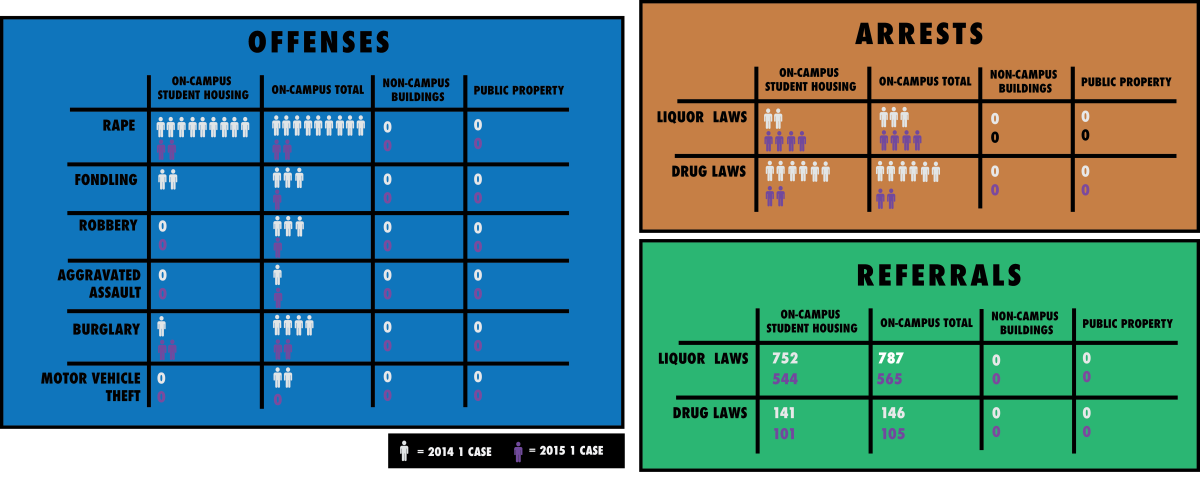2016 Security and Fire Safety report released
By Ana Faguy, ’19 & Sam Henry, ’19
The 2016 Saint Joseph’s University Security and Fire Safety Report revealed a few trends in on-campus crimes compared to the previous year. Rape offenses decreased by 78 percent in 2015, liquor law referrals were down by 28 percent, and burglary offenses decreased by 50 percent.
St. Joe’s, along with various universities across the United States, released their campus Clery report on Oct. 1. The Clery Report is a nationally-mandated crime report released every year. The report is a representation of violations and crimes committed on campuses across the country, its most recent statistics from 2015.
The Clery Act was passed in 1990 after a Lehigh University student, Jeanne Clery, was murdered in 1986. Before that point, there was nothing that required colleges and universities to report crimes that happened on their campuses.
“The Clery Act is a federal law that requires colleges and universities to, number one, disclose sure that would be great campus crime statistics; number two, provide education related to campus safety; and number three, things revolving around preventing campus crime,” Kiersten White, Ph.D., assistant vice president in the Office of Student Life said. “And so the annual security report is one element of the Clery Act requirements, so it’s not the entire law.”

Within the Clery Act, there are four different jurisdictions that universities are required to provide numbers for: On-Campus Student Housing Facilities, On Campus total, Non-Campus Buildings or Property, and Public Property. Non-Campus Buildings are those that the university uses for educational purposes but that are not located on the main campus, and Public Property describes only the areas immediately abuting campus. The Clery Act explains what each jurisdiction is in detail.
The report does not include incidents that happen off-campus, including incidents that take place in the private houses on streets surrounding St. Joe’s and incidents that occur in Manayunk.
The off-campus statistics became especially important after the home invasion that occurred on Oct. 5.
“One of the requirements of Clery is sending what they call to be timely warnings or emergency notifications,” White said. “There are distinct definitions for when you send a timely warning and when you send an emergency notification. That home invasion does not qualify for either of those situations under Clery.”
Even though the Clery Act did not report the home invasion, Director of Public Safety and Security Arthur Grover explained that the policy was still used in the recent home invasion.
“We reacted as if it were a Clery crime…the university was not inclined to do so because of the law, but we felt that morally, we had to do that,” Grover said.
Though off-campus crimes that do not take place on what the Act defines as Public Property are not included in the Clery report, Mary-Elaine Perry, Ph.D., assistant vice president of Student Development and Title IX Coordinator, believes that the report is still highly valuable.
“The report is more than just the numbers, as I said. It talks about all we do to keep students safe and how we educate faculty and staff. The numbers really do give you a sense of the campus, but not as much the neighborhood,” said Perry.
Perry explained how after the report is published, the university discusses how they can be more representative of off-campus crime and more transparent to students in the future.
“This year in particular, there was some new legislation, so we had to make sure that we put in everything that is expected of us,” Perry said. “It requires us to constantly be looking at our policies as well to comply with the law and to make sure we are doing everything we can do to make our students safe.”
This new legislation includes updates in the Violence Against Women Act (VAWA). These changes require the addition of Domestic Violence, Dating Violence, and Stalking as specific reportable categories. It also specifies that universities must include Sexual Assault, Dating Violence, Domestic Violence, and Stalking in their training.
Additionally, when there is a report of sexual misconduct, the university must provide the student or employee with a written explanation of their rights and options for services. The university must also provide written notification to complainants of available options for assistance with academic and living situations, transportation options, working situations, and protective measures on campus.
In sexual misconduct cases, the complainant and respondent must be notified of the outcome simultaneously and in writing.
Taking these recent changes into account, White believes that the Clery Act plays an integral role in college communities.
“If there wasn’t the Clery Act, I don’t know if there would be any [college crime] information out there,” White said.












































